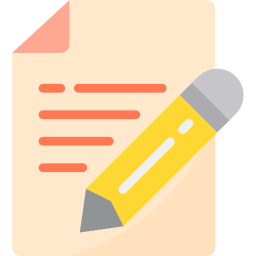advanced listening Food and Nutrition
فایل صوتی درباره ی غذا و تغذیه

UNIT 22
برای دسترسی به دروس بیشتر به لینک های زیر مراجعه کنید.
لغات زبان انگلیسی به تفکیک موضوع
درک مطلب از سطح مبتدی تا پیشرفته
تمامی موضوعات آیلتس اسپیکینگ پارت یک، دو و سه همراه با جواب
Food and Nutrition
.اگر نیاز به مطالعه ی بیشتر دارید به قسمت های زیر مراجعه کنید
:گرامر
گرامر درباره ی حال کامل (منفی کردن و سوالی کردن)
گرامر درباره ی حال کامل استمراری و تفاوت آن با حال کامل
گرامر درباره ی تفاوت صفت های Comparatives and superlatives
:لغت
کلمات مربوط به آشپزی و پختن غذا
کلمات مربوط به توصیف بو، مزه و طعم های مختلف
کلمات مربوط به نام میوه و سبزیجات
Getting Ready
Where do these foods belong in the nutrition pyramid? Write the correct letter next to each item.
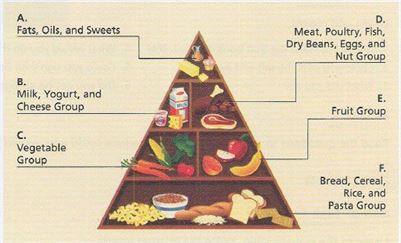
Match the items. Write A, B, C, ... in the gap.
1. ice cream
2. apples
3. noodles
4. chicken
5. hamburgers
6. walnuts
7. carrots
8. pancakes
9. pineapple
10. tuna
Listening 1
People are talking about their eating habits. What does each person eat now? Listen and check the correct picture.
I never pay attention to my diet. I eat whatever I want. There's nothing I like more than a big juicy steak for dinner and chocolate cake and ice cream for dessert. Yum!
2.
I'm trying to cut down on cholesterol, so I've stopped eating eggs, cheese, and red meat. I'm eating a lot more fish and chicken.
3.
I'm trying to put on weight. Everyone tells me I'm too thin, so I've started eating a lot more meat and dairy products. It's great. Now I can go out as often as I want for hamburgers and fries.
4.
I've got a real sweet tooth. I love chocolate, candy, and things like that. But I know it isn't healthy, so I've given all that up. Now the only sweets I have are fruit.
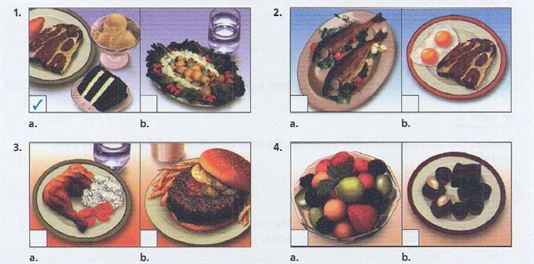
Write a or b in the gap.
12
34
Listening 2
Task 1
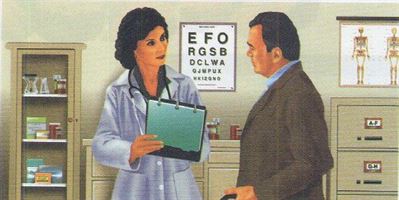
A doctor is talking to her patients about nutrition. What advice does she give each person? Listen and circle the correct answer.
Well, from what you've been telling me, Mr. Grant, it sounds like you're already eating more vegetables. That's good. But you should definitely eat less cheese. It has a lot of sodium and fat in it. That might explain why your cholesterol level is so high.
2.
I'm glad to hear that you've been eating fish more often, Linda. It's much better for you than meat because it has a lot less fat in it. It will probably help your high blood pressure, too. Now, you should also try to eat more fresh fruit, too, especially berries, like strawberries and blueberries-they're full of antioxidants.
3.
Well, Chris, I think it's great that you've been eating a lot of vegetables. I see you've been having fruit for dessert instead of ice cream, too. That's excellent. But you say you've been feeling tired and weak lately, so you should eat more meat.
4.
Ms. Barton, I'm wondering about all the bread you've been eating. I know you need to lose weight, and sometimes eating a lot of bread makes that very difficult. So, I'd like you to eat less bread for a few weeks. Otherwise, your diet seems pretty well-balanced. You're eating meat, but not too much meat, as well as a lot of fruit and vegetables.
5.
You're right, Mr. O'Brien. You're definitely losing too much weight. It's probably because you haven't been eating meat. Now, even if you don't eat meat, you still need protein. Why don't you try eating more eggs, beans, and cheese? They've got a lot of protein. I'm sure that will help.
6.
Well, Mrs. Johnson, I see here that you've been having stomachaches in the mornings lately. And you say you have cereal with milk for breakfast every day. I think the problem is that the milk is difficult for you to digest. That means you shouldn't eat dairy products, like milk and cheese. I suggest you stop drinking milk for a few months. Try having eggs for breakfast instead of cereal.
1.
a. eat fewer vegetables
b. eat less cheese (correct)
c. eat a lot of fat
2.
3.
4.
5.
6.
Task 2
Listen again. What is each person's health problem? Write the correct letter.
Well, from what you've been telling me, Mr. Grant, it sounds like you're already eating more vegetables. That's good. But you should definitely eat less cheese. It has a lot of sodium and fat in it. That might explain why your cholesterol level is so high.
2.
I'm glad to hear that you've been eating fish more often, Linda. It's much better for you than meat because it has a lot less fat in it. It will probably help your high blood pressure, too. Now, you should also try to eat more fresh fruit, too, especially berries, like strawberries and blueberries-they're full of antioxidants.
3.
Well, Chris, I think it's great that you've been eating a lot of vegetables. I see you've been having fruit for dessert instead of ice cream, too. That's excellent. But you say you've been feeling tired and weak lately, so you should eat more meat.
4.
Ms. Barton, I'm wondering about all the bread you've been eating. I know you need to lose weight, and sometimes eating a lot of bread makes that very difficult. So, I'd like you to eat less bread for a few weeks. Otherwise, your diet seems pretty well-balanced. You're eating meat, but not too much meat, as well as a lot of fruit and vegetables.
5.
You're right, Mr. O'Brien. You're definitely losing too much weight. It's probably because you haven't been eating meat. Now, even if you don't eat meat, you still need protein. Why don't you try eating more eggs, beans, and cheese? They've got a lot of protein. I'm sure that will help.
6.
Well, Mrs. Johnson, I see here that you've been having stomachaches in the mornings lately. And you say you have cereal with milk for breakfast every day. I think the problem is that the milk is difficult for you to digest. That means you shouldn't eat dairy products, like milk and cheese. I suggest you stop drinking milk for a few months. Try having eggs for breakfast instead of cereal.
Match the people and health problems.
Listening 3
Task 1
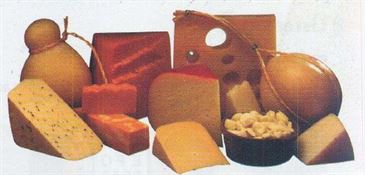
A cheesemaker is giving a talk about cheese. Are these statements true or false? Listen and check the correct answer.
There are hundreds of different types of cheese around the world, but they are almost always made from the same thing: milk. Cheese is made from several different kinds of milk, including cow's, sheep's, and goat's milk. Most cheese in the United States is made from cow's milk. Cheese also contains water. A soft cheese, like Brie, contains more water than a hard cheese, like Parmesan.
Cheese is produced through a process called "fermentation." The process of making cheese was probably discovered by chance. Ancient people used to make bags using the skin from an animal's stomach. When they used these skin bags to carry milk, bacteria from the animal's skin reacted with the milk to begin the fermentation. The result was cheese.
Today, cheese making is a very scientific process. First, the milk that will be used is pasteurized, which means that it is heated to remove all bacteria. Then, specially cultivated bacteria, called "cultures," are added to the milk. The milk is kept fairly warm during this period to help the cultures grow. As they grow, the bacteria cultures sometimes release bubbles of carbon dioxide. These bubbles help make the holes in Swiss cheese.
Next, as the milk ripens, it forms a solid substance. This substance is called "curd." The curd is removed, and the water is drained from it. The curd forms the basis of the cheese and may be treated in different ways.
Finally, once it is matured and dried, the cheese is ready to eat.
Write True or False in the gap. You can also write T or F.
1. Cheese was first made over 3,000 years ago.
2. Cheese contains vitamins.
3. Most cheese in the United States is made from goat's milk.
4. Cheese doesn't contain water.
5. The process of making cheese was probably discovered by chance.
6. Pasteurized milk contains bacteria.
7. Carbon dioxide is added to pasteurized milk to make cheese.
8. Curd is a liquid.
Task 2
Listen again. How is cheese made? Number the steps from 1 to 5.
There are hundreds of different types of cheese around the world, but they are almost always made from the same thing: milk. Cheese is made from several different kinds of milk, including cow's, sheep's, and goat's milk. Most cheese in the United States is made from cow's milk. Cheese also contains water. A soft cheese, like Brie, contains more water than a hard cheese, like Parmesan.
Cheese is produced through a process called "fermentation." The process of making cheese was probably discovered by chance. Ancient people used to make bags using the skin from an animal's stomach. When they used these skin bags to carry milk, bacteria from the animal's skin reacted with the milk to begin the fermentation. The result was cheese.
Today, cheese making is a very scientific process. First, the milk that will be used is pasteurized, which means that it is heated to remove all bacteria. Then, specially cultivated bacteria, called "cultures," are added to the milk. The milk is kept fairly warm during this period to help the cultures grow. As they grow, the bacteria cultures sometimes release bubbles of carbon dioxide. These bubbles help make the holes in Swiss cheese.
Next, as the milk ripens, it forms a solid substance. This substance is called "curd." The curd is removed, and the water is drained from it. The curd forms the basis of the cheese and may be treated in different ways.
Finally, once it is matured and dried, the cheese is ready to eat.
Number the items.
The milk forms a solid substance.
Specially cultivated bacteria are added to the milk.
The milk is heated to remove all bacteria._1_
The curd is removed and drained.
The milk is kept warm so the cultures can grow.


